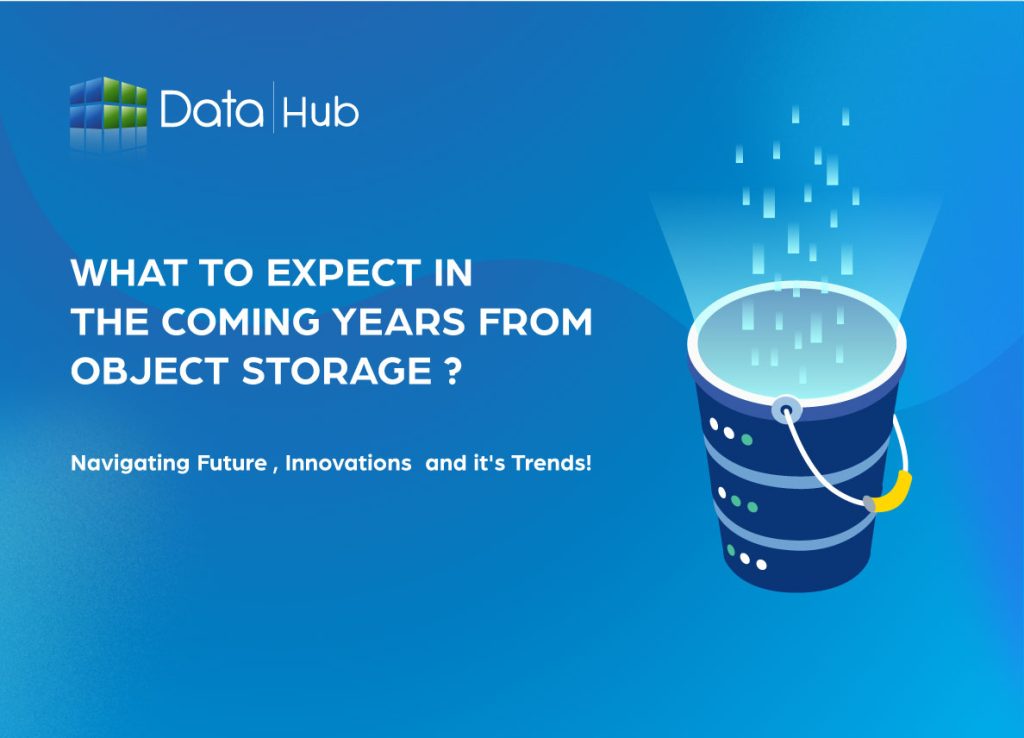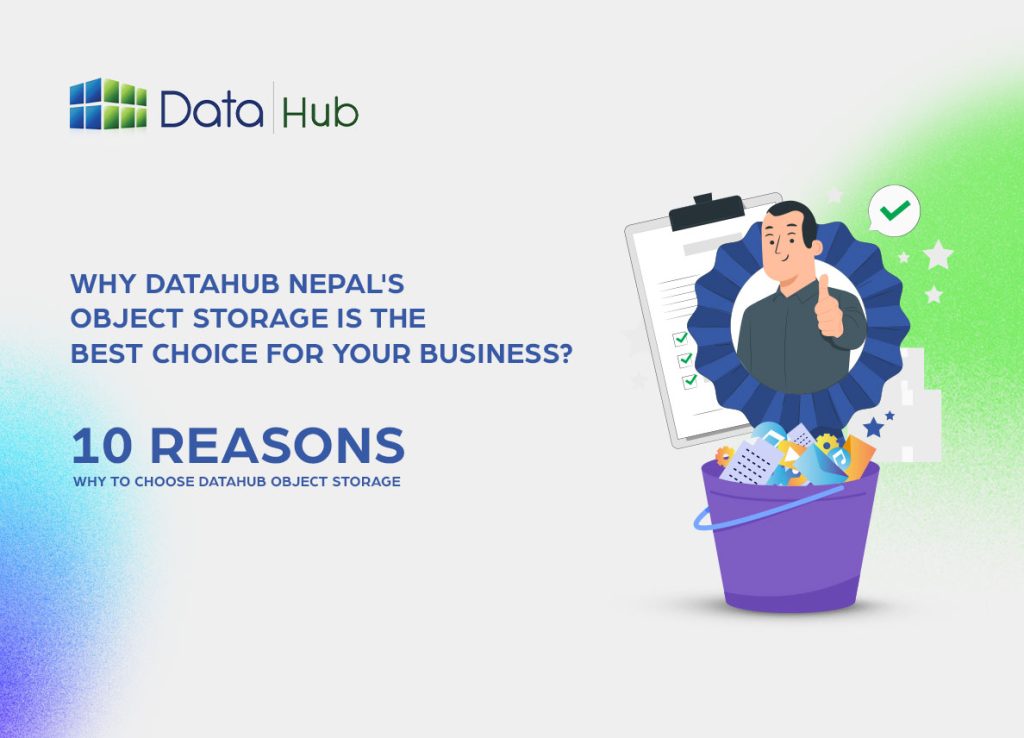The Future of Object Storage: Trends to Watch in 2026!

Object storage, known for its capacity to manage large volumes of unstructured data, will play an important role in shaping the future of data management. IT leaders are managing more data than ever before, and the amount keeps growing every day. These trends, from artificial intelligence integration to increased security measures, hold great potential to transform how we access and manage data. How can businesses securely store all this information while still making it easily accessible for employees? In this blog, we’ll take a closer look at some key trends expected to shape object storage future in 2026 and beyond. Explore What is an Object Storage? (Benefits, Use cases) What Is Object Storage? Object storage is an architecture developed to store large volumes of unstructured data such as videos, images, backups and logs. Organizing information into objects comprising of data itself, metadata and unique identifiers makes this method of data storage highly scalable and ideal for cloud-based large scale data storage solutions. Each object comes with three main components: This set up makes storing, retrieving and managing data effortlessly whether for small businesses or global enterprises alike. The Future of Object Storage: Trends to Watch 1. Rise of AI and Machine Learning: One of the latest innovations is to combine AI/machine learning technology with object storage systems. These technologies will enable smarter data management by automating categorization, indexing, and retrieval processes. Imagine having access to a system that automatically tags and organizes your data based on its content, making it simpler for you to find what you need without manually searching through gigabytes of information. Not only will this help enhance efficiency, but it will also create opportunities for data analysis and insight. Machine learning algorithms are powerful tools for uncovering patterns and trends within large datasets, helping organizations make data-driven decisions. Artificial Intelligence can also forecast future storage needs, optimizing resource allocation and lowering costs. 2. Enhanced Security Measures: Cyber-attacks are becoming an increasing threat, security remains a top priority of any data storage solution. Object storage features advanced encryption techniques and immutable storage options to ensure security and compliance. In the future, these capabilities will continue to evolve with innovations like real-time threat detection and enhanced immutability features. Immutable storage ensures that once data has been written to disk, it cannot be altered or deleted without first going through an authentication process. This provides additional protection from ransomware attacks or any other forms of malicious activities that attempt to access stored information. These enhanced security measures will give businesses peace of mind and ensure compliance with stringent data protection regulations. Advanced security features may include multi-factor authentication (MFA), role-based access control (RBAC), and continuous monitoring. These measures will assist in preventing unapproved access and quickly identify any threats in real time. By establishing strict security protocols, organizations can protect sensitive customer data while earning customer trust. 3. Scalability and Flexibility: As data volumes increase rapidly, storage solutions must provide both scalability and flexibility to accommodate this growth. Today’s rapid data growth requires scalable solutions for storage and management, making object storage a critical necessity. In the future, object storage will become even more advanced, offering unparalleled scalability to meet evolving demands. Flexibility should also be top of mind; storage solutions must quickly adapt to changing business requirements without necessitating major infrastructure modifications. Scalability and flexibility will become key assets for businesses looking to stay agile and competitive in today’s data-driven environment. Scalable object storage solutions feature distributed architectures that enable them to manage vast amounts of data across various locations. This distributed approach will increase fault tolerance and data redundancy, providing greater availability and reliability. Object storage solutions will support hybrid and multi-cloud environments, allowing businesses to take full advantage of each platform’s strengths. Learn How Object Storage Works (Complete Working Mechanism, Architecture)? 4. Edge Computing Integration: Edge computing brings data processing closer to its source of generation. Integrating object storage with edge computing will reduce latency and speed up access speeds to the data stored therein. Real-time data analysis is increasingly essential in applications like IoT devices and autonomous vehicles. Businesses can leverage data-processing at the edge to make faster decisions while decreasing load on central storage systems. Edge object storage solutions will enable seamless integration with edge devices for real-time data collection and analysis. Healthcare, manufacturing and transportation sectors will especially find this beneficial as timely access to data is imperative for business success. Edge computing will also reduce bandwidth use and operational costs by eliminating the need to transfer large datasets to central data centers. 5. Sustainability and Energy Efficiency: As environmental awareness rises, energy efficiency and sustainability have become essential considerations when selecting data storage solutions. Future object storage systems will emphasize energy reduction and green technology implementation. Implementing energy-saving hardware, optimizing data centers for improved cooling, and adopting renewable energy sources may all be options for energy conservation. By prioritizing sustainability, businesses can reduce their carbon footprint and help build a greener world. Sustainable object storage solutions will incorporate energy-saving hardware components, such as low-power processors and solid-state drives (SSDs). Furthermore, data centers will implement advanced cooling techniques, such as liquid cooling and free cooling, in order to lower energy usage and save costs. Organizations will increasingly explore alternative sources of energy like solar and wind to power their data centers and reduce environmental impact. 6. Regulatory Compliance: Data privacy regulations are becoming more stringent, and businesses must ensure their storage solutions comply with these standards. Object storage systems provide robust data governance features, including audit trails and compliance reporting, to meet regulatory requirements. In the future, these capabilities will be further enhanced with more automated compliance checks, real-time governance insights, and integration with advanced regulatory frameworks. These tools will assist organizations in meeting regulatory requirements and avoiding fines or penalties. Compliance will be key to building customer trust and protecting sensitive data. Compliance features will include automated data classification, retention policies and legal hold capabilities. These features will enable
10 Reasons DataHub Nepal Object Storage is Ideal for Your Business

Effective data management has become one of the cornerstones of running any successful business in today’s fast-paced digital environment. No matter whether it is for customer records, files or business analytics, having a reliable data storage solution in place can make all the difference in ensuring smooth operations. DataHub Nepal Object Storage offers businesses in Nepal the ideal storage solution. This blog explores why DataHub Nepal Object Storage stands out and should be your go-to solution for managing data. Explore What is an Object Storage? (Benefits, Use cases) What is Object Storage, and Why is it Important? Let’s get started by understanding object storage from its core. Data storage systems created to organize files, videos, images and documents as objects makes retrieving and managing information much simpler than traditional file systems. Contrasting with this model, object storage offers an innovative alternative capable of handling massive volumes of unstructured information while remaining highly scalable. Why Should Businesses Care About Object Storage? Businesses benefit greatly from storage services; object storage offers multiple advantages: With Nepal businesses increasingly digitizing, object storage provides the ideal way to handle their growing data requirements. Why Do Nepalese Businesses Need Object Storage? Nepalese businesses – from startups to established enterprises – are grappling with an ever-increasing amount of data. Traditional storage solutions like hard drives or basic cloud services typically feature limitations like high costs, slow speeds, or poor security. Object storage offers an efficient, flexible, and secure method of storing and managing data. Businesses operating in Nepal know the importance of having an effective data storage solution is rising exponentially due to its rapidly developing digital infrastructure. No matter what industry you operate in, object storage provides the scalability and dependability necessary for growth in a competitive market. Learn How Object Storage Works (Complete Working Mechanism, Architecture)? Why is DataHub Nepal the Right Choice for Object Storage in Nepal? DataHub Nepal stands out as first S3 Object Storage provider in Nepal for Nepalese Business Owner. Let’s look some of the features that make DataHub Nepal Object Storage the Right choice for businesses in Nepal and neighboring regions. Trusted by Nepalese Businesses DataHub Nepal has become one of the Trusted names in its industry. Understanding the challenges that businesses in Nepal encounter, they offer tailored solutions that produce results. Top Features of DataHub Nepal Object Storage 10 Reasons Why DataHub Nepal Object Storage is the Best Choice Let’s break down why DataHub Nepal Object Storage is the Right solution for your business: 1. Scalability: As businesses expand, so do their data storage needs. With DataHub scalable storage, you should not worry about running out of room; its expansion capabilities allow smooth expansion as you grow. 2. Cost-Effective Solutions: DataHub Nepal goes one step further by adopting a pay-as-you-go model, so only what storage you require will be charged for, saving both time and money over time. 3. Enhanced Security Measures: DataHub takes security very seriously. We use encryption techniques to protect any information stored or in transit and conduct regular audits to detect and address potential vulnerabilities. 4. High Availability and Reliability: Imagine needing access to essential business data at an important meeting, only to discover it is unavailable due to technical glitches. DataHub ensures your data is always accessible with minimal downtime – always making you ready. 5. Easy Integration with Your Current Tools: Existing users of ERP or CRM platforms? DataHub makes it simple and effortless to integrate their object storage solution with these existing tools, streamlining operations without hassle or distraction. 6. 24/7 Customer Support: DataHub recognizes the value of excellent customer support, offering round-the-clock assistance to ensure any issues you are encountering are quickly and efficiently addressed. 7. Local Data Centers for Faster Speeds: Servers located within Nepal provide you with reduced latency and enhanced performance, making it easier to access and manage your data. 8. Optimized Performance for Quick Data Retrieval: DataHub uses advanced algorithms to ensure your data is processed and retrieved quickly, saving time and enhancing productivity. 9. Built-In Analytics and Monitoring Tools: Are you curious to know the amount of storage you’re consuming or tracking trends over time? DataHub features built-in analytics and monitoring tools to keep you up to date and optimize your storage. 10. Eco-Friendly Practices: DataHub Nepal uses energy-saving practices and technology to minimize its environmental footprint, making it a sustainable solution for businesses. How DataHub Nepal Stacks Up Against Competitors? While there are several international object storage providers, DataHub Nepal offers unique advantages for local businesses. Competitive Pricing International providers often have higher costs due to currency conversion and additional fees. DataHub Nepal offers pricing that’s tailored to the local market, making it a more affordable choice. Localized Services With servers and support teams based in Nepal, DataHub offers faster response times, and a deeper understanding of local business needs compared to international providers. How to Get Started with DataHub Nepal Object Storage To get started with DataHub Nepal’s Object Storage, you can reach out to one of our service representatives. They’ll take the time to understand your unique business needs and requirements, providing you with customized recommendations to help you seamlessly move forward with the right object storage service. Conclusion Data is at the core of every modern business, and having an efficient storage solution can give your organization an advantage in its market. DataHub Nepal Object Storage goes beyond simply storing your information; it allows your business to expand unconstrained. DataHub Nepal meets every criterion: from unrivalled scalability and robust security to competitive pricing and local expertise. FAQs

